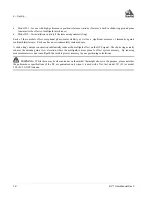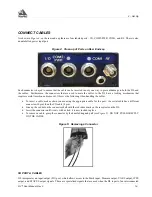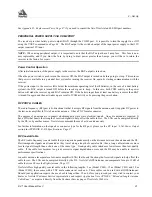
1 – Overview
DL™ User Manual Rev 3
13
Table 2: Feature Summary - DL Models
General
DL-L1
DL-RT20S
DL-L2
DL-RT2
L1 Channels (C/A code) & L2 Channels (P code)
12 & 0
12 & 0
12 & 12
12 & 12
Pseudorange measurements
√
√
√
√
Full-wavelength L2 carrier measurements
×
×
√
√
Ionospheric corrections in position calculations
√
√
√
√
2.5-bit sampling
√
√
√
√
Patented Narrow Correlator tracking technology
√
√
√
√
5 Input / Output strobe signals: mark input (position & time), 1PPS
timing output, measure output, programmable variable-frequency
output, solution status output
√
√
√
√
Fast re-acquisition
√
√
√
√
Peripheral power supply output COM2
√
√
√
√
Output Data Log Formats
DL-L1
DL-RT20S
DL-L2
DL-RT2
NovAtel-proprietary ASCII and binary
√
√
√
√
NMEA Standard
√
√
√
√
RINEX Standard
√
√
√
√
RTCM Standard: Types 1,2,3,9,16,59N
√
√
√
√
RTCA Standard: Types 1,7
√
√
√
√
Data Logging Rates (per second)
DL-L1
DL-RT20S
DL-L2
DL-RT2
Computed Data: Position, speed, direction, & clock offset
10
10 / 5
5
5
Measured Data (Observations): Pseudorange & carrier phase
20
20
10
10
Receiver Control
DL-L1
DL-RT20S
DL-L2
DL-RT2
Clock drift correction
√
√
√
√
Ability to save receiver configuration settings, & almanac
√
√
√
√
Reset (hardware or software activated)
√
√
√
√
Serial port control
√
√
√
√
Datum (table or user-definable)
√
√
√
√
Magnetic variation correction
√
√
√
√
Undulation (table or user-definable)
√
√
√
√
Position, height & velocity constraints
√
√
√
√
Satellite lockout, elevation cut-off and health control
√
√
√
√
OPERATING MODES
Whenever the DL is connected to a power source (regardless of whether the DL is turned “on” or “off”), it detects
whether there is a host computer connected to one of its serial ports. For example, this host computer could be a PC
running NovAtel SoftSurv Utilities software, or a data logger running suitable software. If a host computer is found, the
DL enters Manual mode and waits for a command; otherwise, the DL enters Automatic mode and operates according to
stored commands.
•
Manual Operation: Among other things, a host computer can transmit scheduling and logging parameters,
receive collected data, and turn the DL on or off. In this mode, the DL does not need to be tracking satellites, or
even have an antenna connected to it.
•
Automatic Operation: Once the DL receives configuration commands from a host computer, it operates
according to these parameters. Up to a week’s worth of data collection can be configured in advance.
Summary of Contents for DL
Page 1: ...DL TM User Manual ...














































